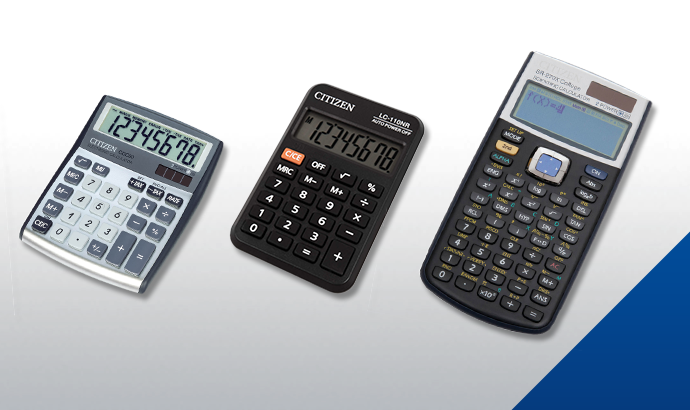Pocket calculator & desktop calculator

€7.10*
Available, delivery time: 1 - 4 working days

€6.50*
Available, delivery time: 1 - 4 working days

€19.60*
Available, delivery time: 1 - 4 working days
Buy a pocket calculator - Always the right result

Whether for private use, school or the office - desktop and pocket calculators are useful everyday helpers that are hard to do without. However, not all pocket calculators are the same. Calculators differ in terms of their functions, features and areas of application. There are very inexpensive pocket calculators and scientific pocket calculators that cost considerably more but can also do much more. To find the ideal device, you need to consider in advance what tasks you want the calculator to fulfil in the future.
Which pocket calculator (school calculator) do I need at school?
Which pocket calculator is needed at school depends very much on the tasks it is intended to fulfil. The classic pocket calculator with its basic functions is certainly a practical helper in everyday school life. However, this is only true up to a certain point. However, as soon as longer and more complex arithmetic tasks have to be solved, the range of functions is no longer sufficient. This is already due to the display, as the display is often only limited to 10 to 12 digits.
The graphing calculator is designed especially for schools. As the name suggests, this calculator can display both graphs and diagrams. This makes it possible not only to display functions, but also to analyse them. For example, by graphically determining zeros, intersections and extreme points. Graphing calculators are a must in secondary schools in particular. However, they are also often used in industrial and scientific professions for various calculations. The typical entry-level models are rather simple. In contrast, the ultra-modern graphics calculators are much more innovative. They are usually equipped with a colour display, backlighting and various additional functions.
Which functions are useful in a pocket calculator?
Simple and therefore inexpensive pocket calculators are designed for uncomplicated and quick use at school, in the office or at home. The standard features of the calculator include the following functions:
- Subtract (-)
- Adding (+)
- Calculating percentages (%)
- Multiply (x)
- Divide (÷)
Depending on the calculator, the functions can be much more extensive. It certainly depends on the context in which you want to use the calculator. Apart from the basic functions, there are also the following additional functions that are useful and included in many standard calculators:
- Power (^)
- Y to the power of X (yx)
- Root calculation (v)
- Sine function (sin)
- Arc sine (sin-1)
- Cosine function (/cos)
- Arcus cosine (cos-1)
- Negative number (-)
- Tangent function (tan)
- Pi (p)
- Switch between degree and bogey (mode)
Apart from this, an automatic switch-off function is particularly useful for battery-operated calculators. This prevents the batteries from discharging unnecessarily. If the calculator is not in use, it switches off automatically after around 5 to 10 minutes. There are also calculators with a tax calculation function. This is always useful if the calculator is used for auditing or invoicing, for example. Calculators with a currency conversion function are there to enable a simple representation of the national currency in any target currency.
Do you need the desktop calculator for scientific calculations or is it more about basic arithmetic? Are root calculations and basic arithmetic necessary? These are all considerations that you need to make before you make a firm decision in favour of a calculator.
How to operate the calculator
Desk and pocket calculators are usually battery-operated. However, there are also an increasing number of solar-powered calculators on the market. Entry-level models in particular are often exclusively solar-powered. This applies to school calculators, for example. They are therefore very lightweight as no batteries are required. The display is usually relatively small, so power consumption is also low. Solar-powered calculators are only useful if there is always sufficient light available. Solar-powered calculators usually have slightly larger dimensions because there is also space for the solar cells. On the other hand, they can be a little thinner than battery-operated calculators because they do not need the space for replaceable batteries. If you want to be on the safe side, opt for a solar-powered calculator that is equipped with a backup battery. If there is not enough light, the batteries ensure that the calculator continues to work. Battery-operated pocket calculators have a particularly low risk of failure. These are particularly useful when complex calculations and visualisations are required. This is why graphing calculators are usually equipped with batteries.
When do I need a scientific calculator?
The scientific calculator differs significantly from the classic standard calculator. There are a number of additional functions that you can use. Scientific calculators are used in schools in particular. However, they are also increasingly needed in business. With such a calculator, even very complex mathematical formulae can be calculated with ease. In addition to fractions and root calculations, the calculator can also master highly complex tasks. Quite different from a normal pocket calculator. The most obvious difference in a scientific calculator is the number of keys and key combinations. Which model is the right choice depends largely on the intended use. At school, a normal scientific calculator with basic features such as the basic arithmetic operations and a few additional functions is usually sufficient. At work, currency conversion is often also practical, but this can be quite different in some degree programmes and in special engineering professions. More specialised functions are then required.
Other users also searched for these terms:
school calculator, graphing calculator, calculator, battery operated, price, categories, display, power supply, solar, colour, product.


